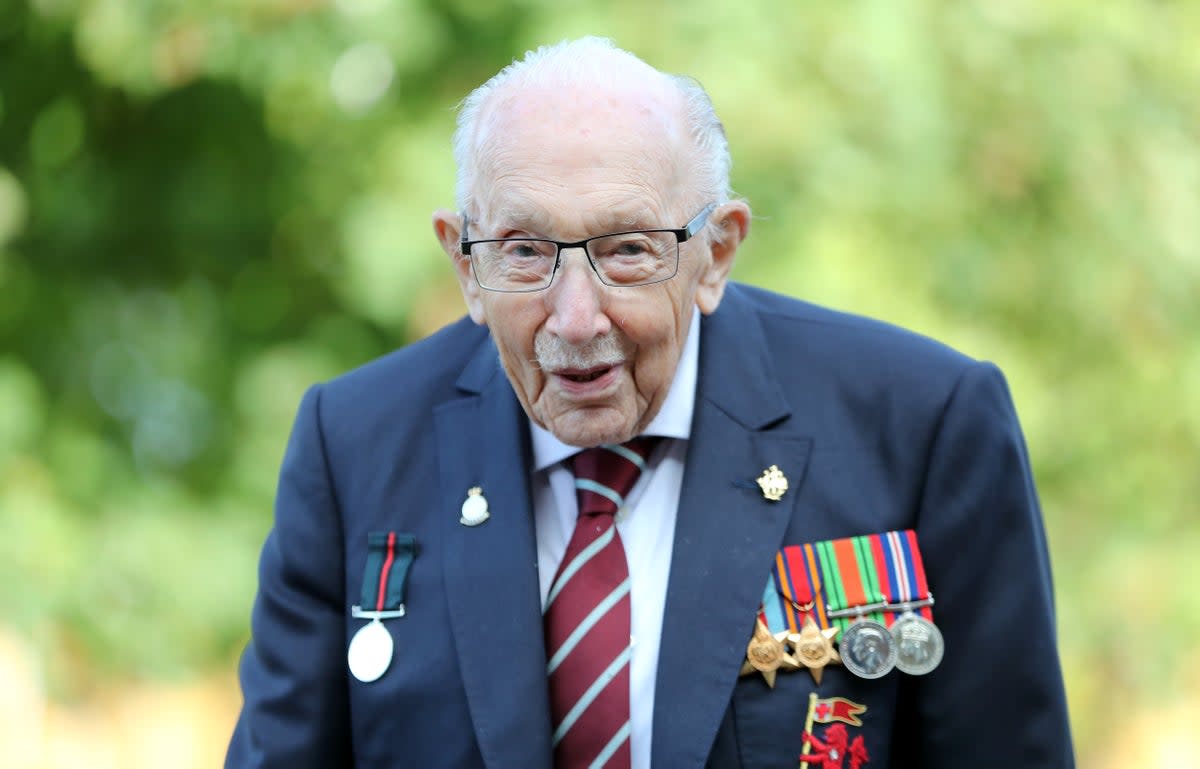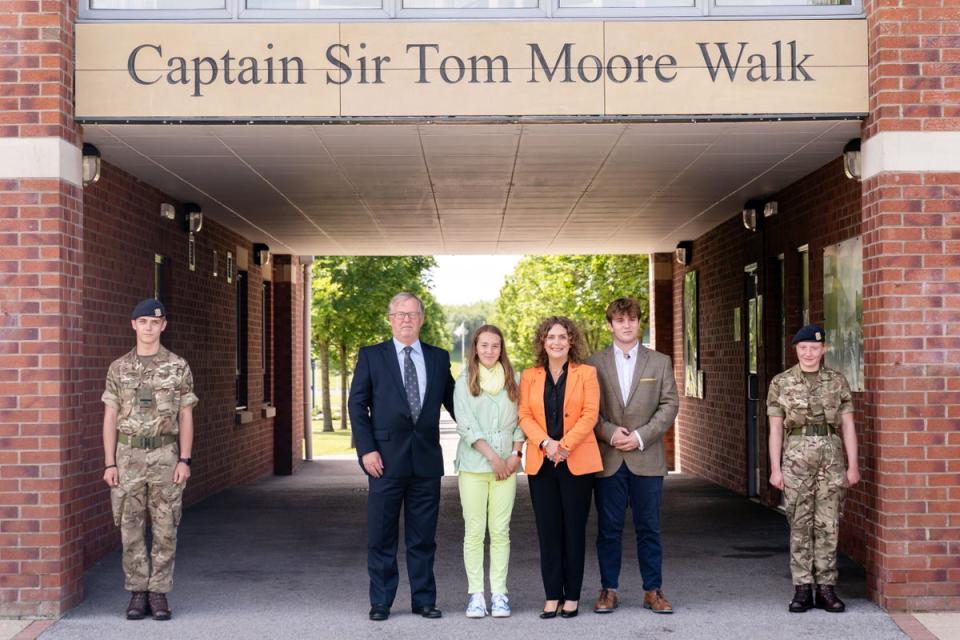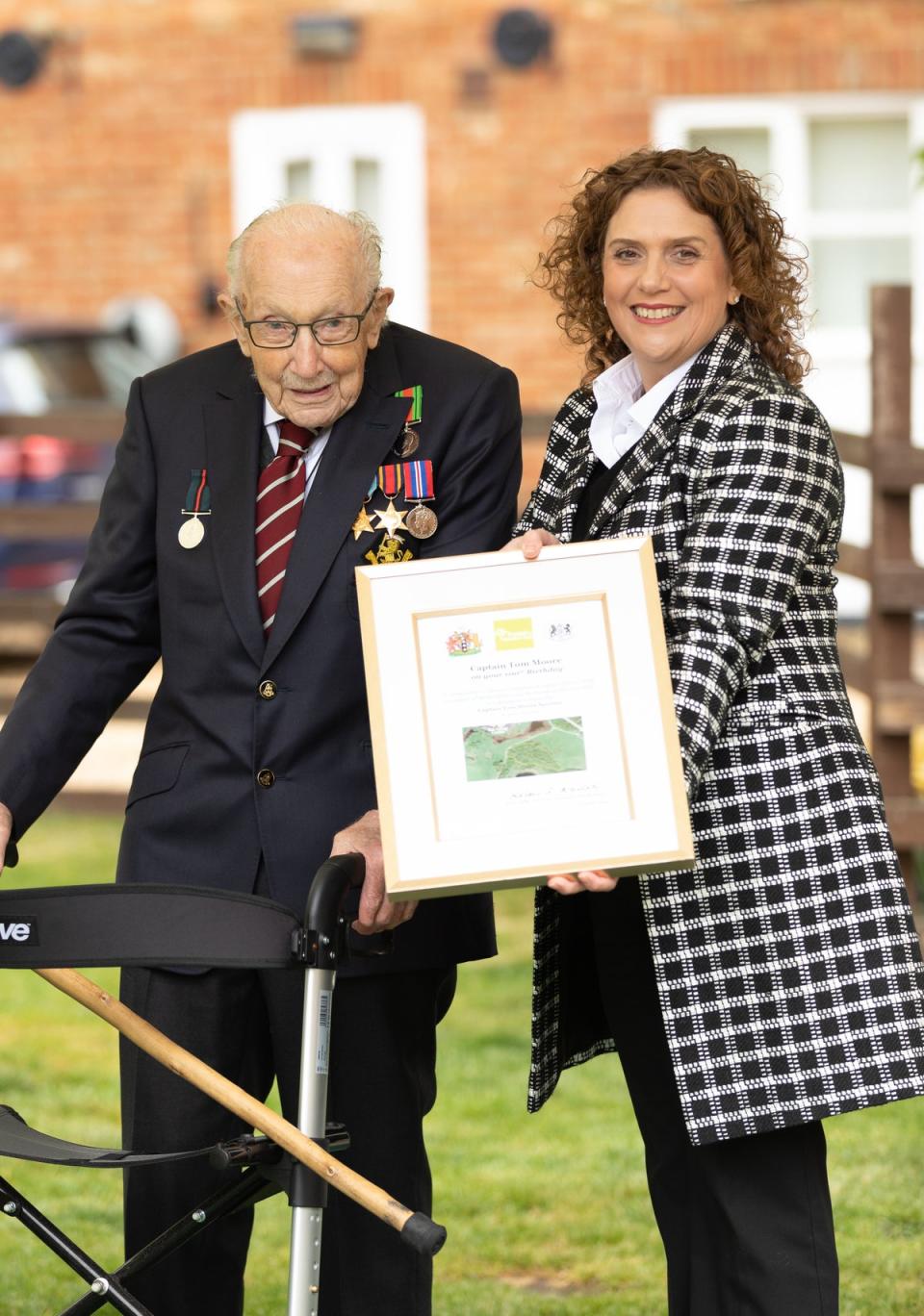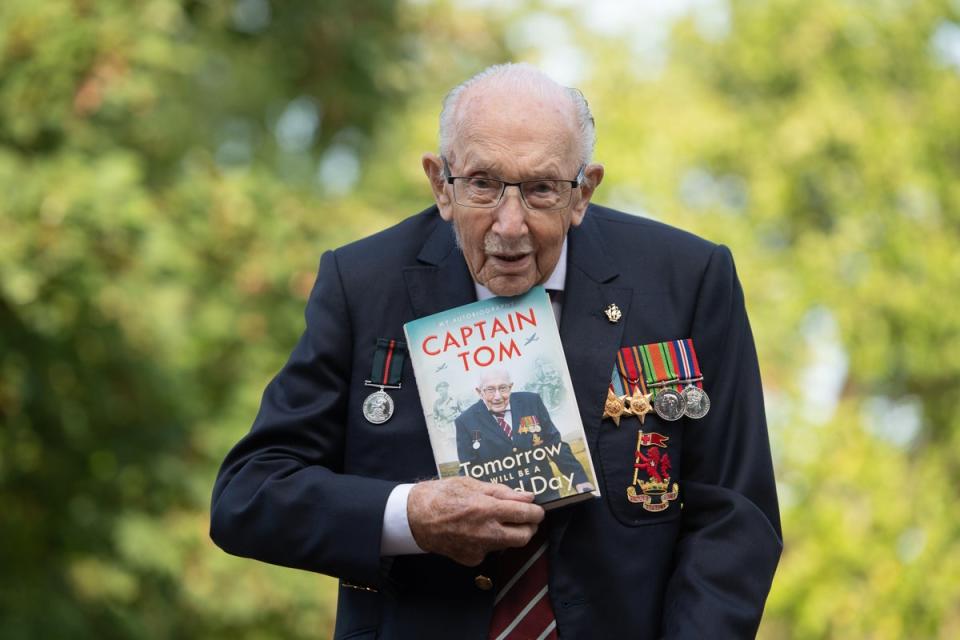Captain Tom: The unanswered questions over charity money, from book donations to branded bottles of gin

Captain Tom’s story began with the capturing of the nation’s heart - and then has slipped into demise with controversy hanging over the 100-year-old’s legacy.
It was back in May 2020 when the Second World War veteran, frustrated at the situation of lockdown, began a challenge to walk 100 laps of his Bedfordshire garden in the hope of raising £1,000.
His brave fundraising event during the darkest days of the Covid pandemic went viral - and soon an incredible £39m was raised for the NHS.
But what followed couldn’t keep up, with concerns the legacy of Captain Tom was tarnished by upset over the trademarking of his name, commercial deals and the direction of proceeds from three books in his name.
Two years ago, the Charity Commission launched an investigation into the Captain Tom Foundation, and last week it said both Captain Tom’s daughter, Hannah Ingram-Moore, and her husband, had been disqualified from being charity trustees.
In a statement, the family said they “fundamentally disagree” with the watchdog’s decision, and complained that the probe had turned into a “relentless pursuit”.

But as the wait continues on the completion of the regulator’s probe there are still many unanswered questions, here we look through some of them:
Registration of the Captain Tom trademark
In the same month of Captain Tom’s fundraising heroics, before the establishment of the Captain Tom Foundation, his family launched a new company called Club Nook Limited.
Ms Ingram-Moore and her husband Colin were appointed directors of the firm, which is now registered to their home in Marston Moretaine in Bedfordshire.
The company was quick to apply for the “Captain Tom” and “Captain Sir Tom” trademarks, initially for goods such as mugs, cups and postcards, and then for products like beers, juices and gins.
The family denied any revenue came from merchandise products in the first year of the firm.

However, the Charity Commission is investigating the Captain Tom Foundation over concern that a “failure to consider intellectual property and trademark issues” when the charity was set up gave Club Nook Limited the opportunity to use the trademarks without objection from the charity.
This could have generated “significant profit” for the company, the commission added.
In response, the Ingram-Moore family said Club Nook Limited made its application for trademarks before the formation of the Captain Tom Foundation, and that neither Ms Ingram-Moore or her partner, Colin, were trustees of the charity at its launch.
More is likely to come on what discussions were had over the trademarks, if any, between the charity and the family at the outcome of the regulator’s investigation.
The Charity Commission probe is also looking at whether trustees “adequately managed conflicts of interest, including with private companies connected to the Ingram-Moore family” and “complied with and fulfilled their duties and responsibilities under charity law”.
The profits from Captain Tom’s first three books
Much focus over the past year has been on the proceeds of three of Captain Tom’s books after Ms Ingram-Moore admitted to keeping profits from the publications.
Captain Tom wrote three books published by Penguin Random House - Captain Tom’s Life Lessons, One Hundred Steps and his autobiography Tomorrow Will Be a Good Day - before he died in 2021.
In a prologue to his memoir, he said that the publication had “given the chance to raise even more money for the charitable foundation now established in my name”.
But in an interview with Piers Morgan in 2023, Ms Ingram-Moore said £800,000 had gone to Club Nook Limited, the company separate from the Captain Tom Foundation, following her father’s wishes.

Accounts for the family-owned firm for 2020/21 showed an income of £809k, with Colin Ingram-Moore telling Mr Morgan during the same interview for TalkTV that 95 per cent of it came from the three books published.
It has since been reported that people working on the books believed a “significant donation” would be made from profits to the Captain Tom Foundation.
Penguin Random House has not disclosed the discussions over the contracts for the publishing of the books. In 2022, a spokesperson told The Independent the details were “confidential” and which they were “not at liberty to disclose”.
They added that “we can categorically assure you that we have not acted in any way that is in breach of charity legislation”. The Independent has contacted the publisher for comment again.
One Hundred Reasons To Hope book
A fourth book was published in Captain Tom’s name called One Hundred Reasons To Hope by Penguin Random House in September, 2021.
With an introduction written by Ms Ingram-Moore, it featured illustrated “true stories of everyday heroes” following Captain Tom’s wish to celebrate other inspirational tales.
The book featured a sticker on the front pledging a £1 donation from each hardback print sale to The Captain Tom Foundation.
However, in July in 2023, after the foundation said it was stopping donations amid the ongoing Charity Commission investigation, the publisher said money raised would be held “until such time as those sums can be transferred to the charity”.
The Independent has asked Penguin Random House how much it is holding from the donations, and where the money would go if the charity ceases to function.
What we know about ‘Captain Tom Rose’
In March 2021, World of Roses introduced a rose plant called “Captain Tom Rose”, selling a potted plant for £22.99, and a potted and gift-wrapped version for £27.99.
The company’s website stated: “Every rose sold donates £2.50 to The Captain Tom Foundation.”
But after the Charity Commission announced it had started a statutory inquiry into the Captain Tom Foundation, the product was withdrawn by the company.
We are proud to introduce The Captain Tom Rose!🌹
This abundant bright red #rose is a superb new classic #hybridtea which has been named after #CaptainTom. For every Rose sold, #WorldofRoses will donate £2.50 to The Captain Tom Foundation. Available now at https://t.co/2YoUkTR3YZ pic.twitter.com/boU9ftwmDX— World of Roses (@WorldofRosesUK) January 12, 2021
In same year, David White, director of World of Roses, told The Independent that around 20,000 plants had been sold, with more than £50,000 donated to the foundation.
At the time, The Captain Tom Foundation said: “We can confirm David White, World of Roses managing director’s account of the donation paid to the Captain Tom Foundation.”
No exact amount received is mentioned in the charity’s last accounts submitted to the Charity Commission for the period 1 June 2021 to 30 November 2022 - although income does not need to be broken down by each donation.
In total, the charity received £402,854 during the period.
Captain Tom branded gin
In November 2020, The Otterbeck Distillery announced it was selling Captain Sir Tom gin, shortly after the Yorkshire-based company was launched. A 70cl gin was sold at £35.95 a bottle.
It was first advertised with “our friend” Captain Tom holding a bottle while wearing a Captain Tom Foundation-branded jacket, with the distillery reportedly saying “proceeds” would go to the charity.
We are honoured to have partnered with our friend @captaintommoore in supporting his foundation, producing this wonderful London Dry Gin. Available to purchase from our website https://t.co/auMRZK7hiJ pic.twitter.com/vTi5vnxM82
— Otterbeck Distillery (@OtterbeckD) November 25, 2020
At first, as reported by The Independent, the distillery did not provide the actual amount to be donated from each sale, as required under the Charities Act 1991. Later, an amount was listed on the distillery webpage, with £1 donated to the foundation for every bottle sold.
Another Captain Tom product showcased by the distillery was a £100 “Limited Edition Barrel Aged Gin” , with “all profits” to be donated to the foundation - but again, no amount was not given. The item was removed from the website after The Independent contacted the distillery on the issue.
Today, it’s not clear if the 70cl gin is still being sold by the distillery with the business closed for the summer and no access to its website. The Independent has approached Otterbeck Distillery for comment.
At the time, a statement on behalf of Otterbeck Distillery and the Ingram-Moore family said 100 per cent of profits from the limited edition gin would go to the foundation. They added: “The team at the small family-run Yorkshire business met Captain Sir Tom because of a mutual passion for the Yorkshire Dales and vintage motorcycles and have kindly agreed to give their time and expertise after he expressed an interest in having a gin named after him.
The Captain Tom Gin has won silver at the World Gin Awards! 🥈Along with @OtterbeckD, we created the gin to help fundraise and continue Captain Tom's legacy so are thrilled to see it recognised! Have you given it a try? #CaptainTom pic.twitter.com/TckdfHDgml
— Captain Sir Tom Moore (@captaintommoore) January 28, 2022
“Payment will be made after Otterbeck’s year end accounts are finalised in two months’ time. For the avoidance of doubt, Otterbeck expect after duty and production costs around £30 from each bottle sold to go to the Captain Tom Foundation.”
It’s also not known how much the foundation received as a result of the partnership, if the 70cl gin product is still being sold, or where the £1 donations have gone since the foundation stopped taking money from July 2023.
There is no suggestion of wrongdoing by any of the companies who formed commercial partnerships with the Captain Tom Foundation.


